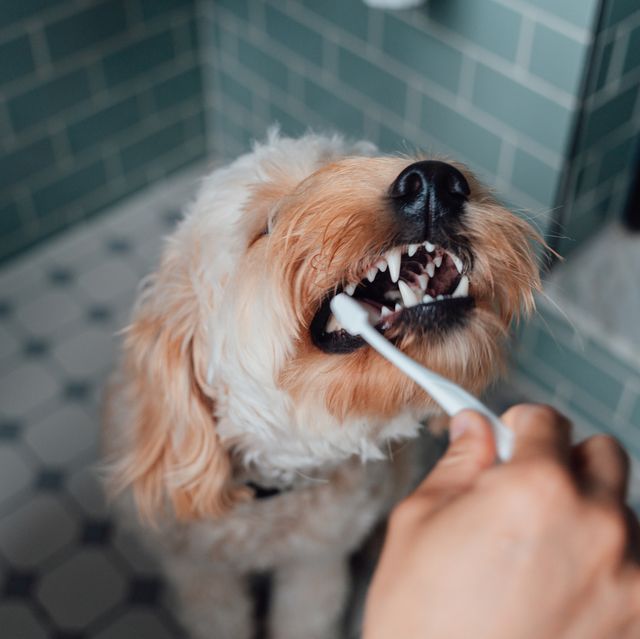Introduction: Why Dog Dental Care Matters
Many dog owners focus on premium food and regular vet checkups, often overlooking the silent threat that can undermine their pet’s overall health: dental disease. Untreated plaque and tartar accumulation can lead to painful gum inflammation, tooth loss, and systemic issues impacting the heart, kidneys, and liver.
We understand the worry:
“How do I know if my dog’s breath is just ‘dog breath’ or a sign of disease?”
“What are the most effective Dog Dental Care routines that actually work?”
This comprehensive guide cuts through the confusion, outlining veterinarian-recommended tools, proven daily routines, and strategic supplements to proactively safeguard your canine companion’s oral health.

Understanding the Foundations of Canine Dental Health
Optimal Dog Dental Care is built on preventing the progression from soft plaque (a bacteria film) to hard tartar (calcified plaque). This transition is the foundation of Periodontal Disease, affecting four out of five dogs over the age of three.
Key foundations:
-
Mechanical Action: Daily brushing removes plaque before it calcifies.
-
VOHC Seal: Products approved by the Veterinary Oral Health Council are scientifically proven to reduce plaque and tartar.
-
Preventative Focus: Chronic dental pain diminishes quality of life and increases future veterinary costs.
5 Key Strategies (Products & Habits) for Healthy Teeth
1. The Gold Standard Habit: Daily Brushing
The most effective habit is brushing your dog’s teeth once a day with veterinary enzymatic toothpaste.
-
Use size-appropriate brushes (finger brushes for small dogs, multi-headed for large breeds).
-
Brushing even 30 seconds daily is far better than none.
-
Enzymatic action breaks down bacteria, and mechanical scrubbing removes plaque.
👉 Related reading: Dog Training Basics: Essential Commands Every Owner Should Master
2. The Best Product: VOHC-Approved Dental Chews
VOHC-approved chews reduce plaque and tartar by at least 10%.
-
Choose chews that require gnawing and match the dog’s size.
-
Use strategically as a daily reward.
3. Advanced Habit: Regular Veterinary Cleanings
Professional dental cleaning under anesthesia is non-negotiable every 1–3 years.
-
Allows deep scaling below the gumline.
-
Dental radiographs detect invisible subgingival disease.
-
Essential for preventative care.
4. Strategic Product: Water Additives and Oral Rinses
For dogs resistant to brushing:
-
Products with Zinc gluconate or Chlorhexidine slow bacterial growth.
-
Not substitutes for brushing but effective for plaque control and halitosis.
5. Dietary Support: Specialized Dental Diets
Certain prescription diets:
-
Mechanically scrub teeth with unique kibble shapes.
-
Contain tartar-preventing ingredients.
-
Often VOHC-approved, excellent for breeds prone to rapid tartar buildup.
How to Introduce the Daily Brushing Habit
-
Start Slowly (Taste Test): Let your dog lick toothpaste off your finger.
-
Introduce the Tool: Put a small amount of paste on the brush, let the dog lick it.
-
The Quick Brush: Focus on canines and back molars for 5–10 seconds. Reward immediately after.
Tip: Always pair with positive reinforcement to make brushing enjoyable.
Building Your Professional Dental Team
The Primary Veterinarian
-
Annual oral exams and cleaning recommendations.
-
Advises on products suitable for breed and age.
The Veterinary Dental Specialist
-
Handles advanced cases: root canals, extractions, severe periodontal disease.
The Home Health Monitor
-
Check gums weekly for pink color and tartar buildup.
-
Daily observation prevents silent progression of disease.
Where to Find the Best Products for Dog Dental Care
-
Veterinary Clinics: VOHC-approved products and prescription dental diets.
-
VOHC Official Website: <a href=”https://www.vohc.org” target=”_blank” rel=”noopener noreferrer”>VOHC.org</a> provides a definitive list of approved products.
-
Specialized Pet Supply Retailers: Verify VOHC seal before purchase.
👉 Helpful resource: American Kennel Club (AKC) Training Guides
Frequently Asked Questions (FAQ)
Q1: Does dry kibble clean my dog’s teeth?
A: No. Only specialized VOHC dental diets provide significant cleaning benefits.
Q2: Are rawhide or bones safe?
A: Avoid hard bones or antlers; flexible dental chews or toys are safer.
Q3: How often should my dog have a professional dental cleaning?
A: Average is every 1–3 years, depending on breed and oral health.
Disclaimer
This article is for informational and educational purposes only. It is not a substitute for professional veterinary advice. Always consult your vet before starting new dental care routines or products.